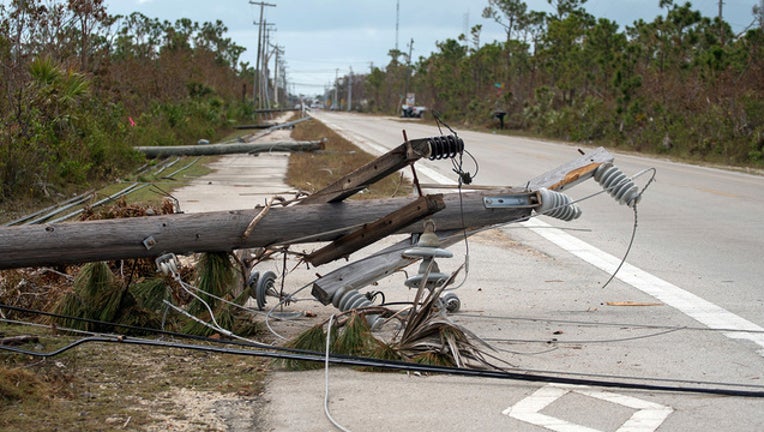Plan could spur more underground power lines -- with a cost

Felled power lines are seen by the roadside in Big Pine Key on September 16, 2017 in Marathon, Florida following Hurricane Irma. (Photo by Angel Valentin/Getty Images)
TALLAHASSEE, Fla. (NSF) - After hurricanes during the past three years knocked out electricity for millions of Floridians, lawmakers are moving forward with regulatory changes that could lead to more underground power lines.
But it would come at a cost.
A House panel this week approved a bill (HB 797) that would create a new process that would allow utilities to pass along costs to customers for storm-protection projects, including installing underground power lines. A similar bill (SB 796) has received unanimous approval from two committees.
Supporters say the proposals could help reduce the number of residents and businesses left in the dark when future hurricanes blow through Florida.
“Great bill. I went through the hurricane in 2004 and lost my power. My neighbors lost their power. My whole community lost their power,” said Rep. Michael Grant, a Port Charlotte Republican whose area sustained massive damage in 2004 from Hurricane Charley. “When you come to a situation where your schools are shut down for weeks at a time and you’re importing workers from Wisconsin in the middle of August to reconnect neighborhoods and businesses, you’ll understand why this bill is so important.”
RELATED: Florida bill would punish people who leave behind dogs during hurricanes
But opponents expressed concerns about the revamped regulatory process, which would create a new avenue for utilities to recover costs from customers. Jon Moyle, an attorney for the Florida Industrial Power Users Group, said the bill would lead to a “one-way financial street” that would spur higher utility bills.
“This bill will increase rates,” said Moyle, whose group includes large electricity users and frequently is involved in utility-regulatory issues.
Lawmakers, regulators and utility companies have long faced questions about why more power lines are not buried underground in the hurricane-prone state. Those questions were refueled after widespread power outages from hurricanes Michael and Hermine in 2016, Hurricane Irma in 2017 and Hurricane Matthew in 2018.
But a big part of the issue is that it is expensive to take down overhead power lines in already-developed areas and bury them underground.
RELATED: Tyndall Air Force Base slowly rebuilds with eyes on the future
The legislation moving through the House and Senate deals with a process that utilities go through at the Florida Public Service Commission to submit plans for hardening their systems to better withstand punishing hurricanes --- and how such improvements should be financed.
Generally, utilities such as Florida Power & Light, Duke Energy Florida, Tampa Electric Co. and Gulf Power incorporate storm-hardening costs in their base electric rates. The Public Service Commission goes through months-long processes to determine base rates, which involve financial and technical issues that touch myriad parts of utility operations.
While base rates are set for multiple years, utilities also go before the commission annually for approval to pass along costs to customers for specific expenses. A large expense, for example, that is estimated each year and passed along to customers is the cost of natural gas and other fuel for power plants.
The House and Senate bills would set up a similar process for utilities to recover storm-protection costs, including the costs of putting power lines underground, outside of the base-rate process. The utilities would also be able to earn a rate of return --- profit --- on the projects.
RELATED: Lessons learned from the one home that survived Hurricane Michael
Zayne Smith, a lobbyist for AARP Florida, told the House Government Operations & Technology Appropriations Subcommittee on Monday that her group opposes revamping the way utilities can recover the costs.
“AARP certainly supports a harder, stronger, more-resilient grid,” Smith said. “Our members depend on power more than probably many people do. But the way this bill is written will also shift costs to consumers more than it already is. Our contention is, keep it in the base rate.”
The House panel, however, voted unanimously to approve the bill. Sponsor Randy Fine, R-Palm Bay, pointed to the costs of restoring power after storms and the financial and personal impacts of outages on businesses and residents.
“Certainly, taking lines that go above ground and putting them underground will cost money. And there will be an expense associated with it,” Fine said. “But let’s talk about the cost of doing nothing.”

